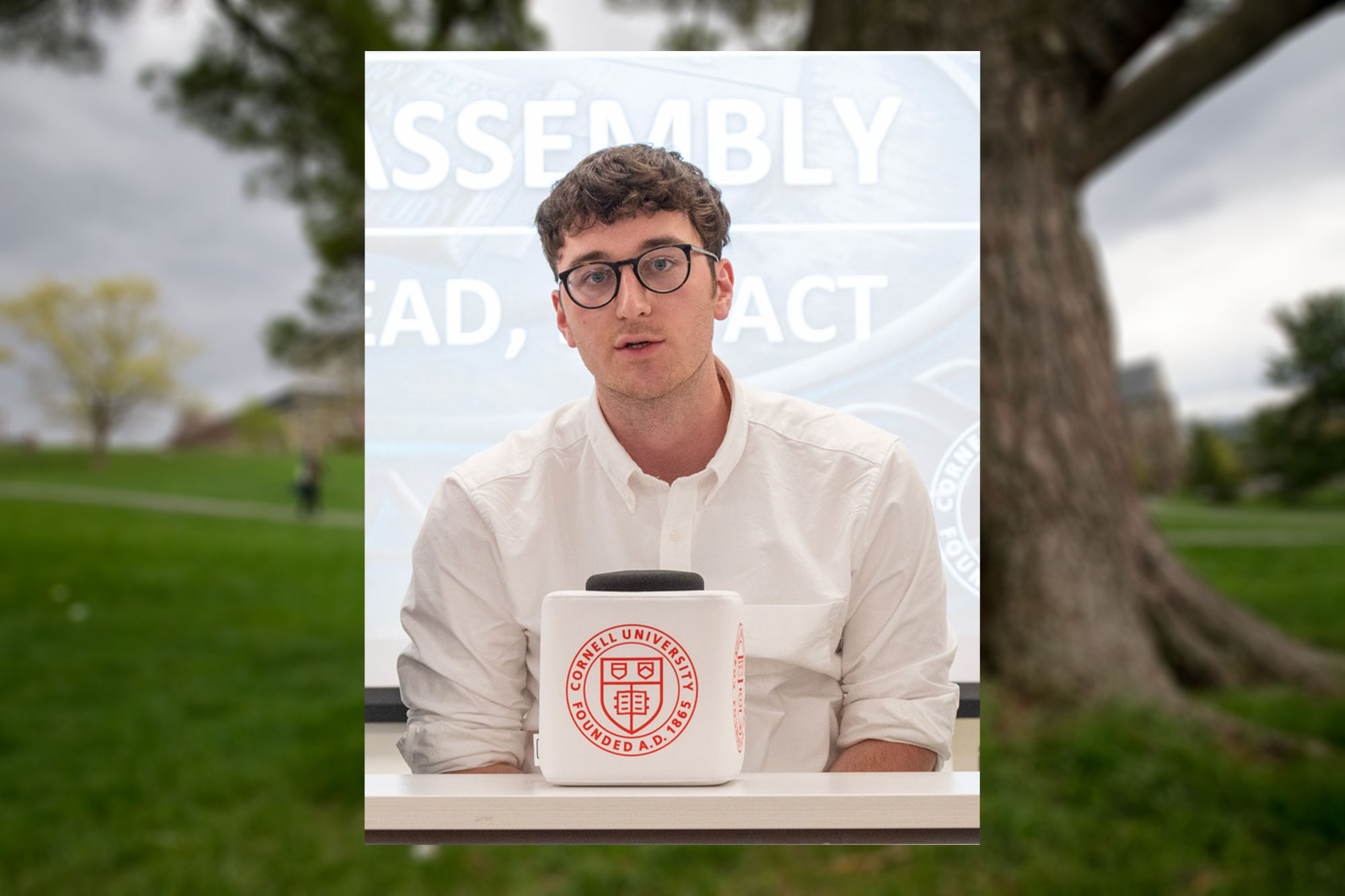Through her tireless work on behalf of the Cornell community, President Pollack has left us a university that is moving forward with confidence and looking to the future with strength. Thank you, President Pollack.
Letters To
LETTER TO THE EDITOR | The Encampment is a Repeat of History
|
To the Editor:
Re: “Students Stage Pro-Palestine Encampment on the Arts Quad” (news, April 25)
35 years ago I was involved in another divestment movement at Cornell — that of divesting from South Africa’s Apartheid regime. It was my first experience of political activism, and much of what is happening now appears to be repeating what happened then albeit with an added element of racial/ethnic tension. We built a shantytown on the Main Quad, held protests in front of various buildings, invaded the President’s office and disrupted a Board of Trustees meeting. Did it influence Cornell’s investment policy? To this day, I do not know.
Letters To
LETTER TO THE EDITOR | The Letter from Professors Weaponizes Expertise
|
To the Editor:
Re: “On Language, Misinformation and Divisiveness” (letters, April 29)
In an April 29 letter to The Sun, a group of Cornell professors opposed the University’s condemnation of the chant “there is only one solution, Intifada Revolution” on the grounds that the University’s statement was “based on a failure to understand the literal and historical meaning of an Arabic word, intifada.” Their argument attempts to divorce the word “intifada” from its well-understood meaning within the Israeli-Palestinian conflict and, in so doing, give the air of academic legitimacy to a pro-terrorism chant.
There are many examples of words with general meanings that take on specific meaning when applied to specific historical events. For example, the word “holocaust’” has a literal meaning (a burnt sacrifice), but a very different meaning in the context of World War II. Likewise, the word “intifada” has a specific meaning in the context of the Israeli-Palestinian conflict. The specific historical periods that the word “intifada” refer to are the First and Second Intifadas, which took place from 1987-1993 and 2000-2005, respectively. While both intifadas were characterized by Palestinian terror attacks against Israelis, the Second Intifada was a particularly painful and scarring period. Over 1,000 Israelis were killed, largely in random acts of terrorism that were meant to make everyday life in Israel psychologically traumatizing (such as suicide bombings in buses, Passover seders, restaurants and markets). As one article puts it:
Mind-numbing terrorism made it scary to ride a bus, nerve-wracking to send kids to school, a psychological effort to take the family downtown for a falafel. Everyone eyed fellow passengers warily on the bus at one time or another during these years – especially fellow passengers wearing coats on a sunny day – wondering if they may be hiding explosives. But according to the professors, considering the meaning of “intifada” in the context in which it is being used is wrong. To use the term properly, they instruct readers to “reach out to subject matter experts … for education on matters related to Arabic, Hebrew, Turkish or Persian language …” In other words, reach out to them.
Their expertise, however, is questionable. A closer look into the professors’ suggested readings for those interested in “expert” opinion on the intifadas reveals not only their false expertise, but also their real agenda.
One of their suggestions is “The Second Palestinian Intifada: A Chronicle of a People’s Struggle” by Dr. Ramzy Baroud. An initial look at Dr. Baroud’s website reveals that he is no dispassionate scholar of the Middle East. He routinely writes about Israel’s lack of a right to exist or defend itself. Even more shockingly, Dr. Baroud taped a video of himself on Twitter with the words “What Happened on October 7th and Why We Should Not Apologize for Palestinian Resistance” written on the screen. In the video, Dr. Baroud claims, “…
Letters To
LETTER TO THE EDITOR | Cornell’s Administration Was Justified in Criticizing Chants
|
Re: Everything That Happened on Day Four of the Encampment (news, April 29)
Cornell’s Administration was justified in calling out and criticizing chants on campus of “There is only one solution: Intifada Revolution!” It was distressing to read the didactic and overly semantic excuses that certain faculty (letters, April 29) and a follow-up story (news, April 30) offered as cover for those violent taunts. If our campus echoed with encouraging chants about the “Klan,” the outrage rightly would rain down from all quarters, and justifications based on the supposedly neutral meaning of the word would be cast aside. Everyone knows what it means to call for “intifada” as the “solution” to the Arab-Israeli conflict: It refers to the spate of murders of Israeli civilians. It was no simple “shaking off” and it certainly is not the solution. While we defend the right of people to engage in protected speech, community members should call out offensive conduct —inside and outside the current encampment. Those saying hateful things, and those providing hollow cover for hate, are deserving of condemnation. — David J. DellaPelle ‘17
Jonathan M. Fordin ‘80
Wayne Forman ’80
Marshall Gilinsky ‘92
Joseph Hellerstein ‘92
Donald Motschwiller ’80
Bennett Pine ‘76
Michael Reiner ‘78
Steven Rosenzweig ‘79
Jarett Wait ’80
Gary Weber ‘81
Barry Weiss ‘81
Sylvia Emmerich Fogel ‘94
Amy Richter ‘92
Ruth Serrousi ‘92
Mark Sherwin ‘80
The Cornell Daily Sun is interested in publishing a broad and diverse set of content from the Cornell and greater Ithaca community. We want to hear what you have to say about this topic or any of our pieces. Here are some guidelines on how to submit.
Letters To
LETTER TO THE EDITOR | Free Expression Has Limits
|
So long as Cornell and law enforcement apply time, place and manner regulations in a content-neutral way, the encampments are not protected by free speech principles.
Letters To
LETTER TO THE EDITOR | Suspension Is Not The Answer
|
The idea that the student protest activities are disruptive to academic life is laughable: the Cornell chimes are far more disruptive, several times a day.
Letters To
LETTER TO THE EDITOR | Union Shop isn’t Academic Freedom
|
Re: “‘Meet Us at the Bargaining Table’: Cornell Graduate Students United Rallies for Employment Protections” (news, April 10)
In coverage of the CGSU-UE’s Rally for Respect, the Cornell Daily Sun broadcasted the union’s unscrutinized propaganda advocating for union shop, a clause in our proposed contract which forces all grad students to support the union as a condition of earning our degrees. Rally speaker Amy Tsai described union shop as a “contract provision that means everyone is automatically a member of CGSU-UE.” This is a lie! Nobody automatically becomes a member. In fact, when MIT’s grad student union was charged with breaking the law for telling this exact lie, the NLRB required them to post a notice of their unfair labor practice. In reality, the union can at most compel us to pay “agency fees,” regular dues minus those funds dedicated to political activity, while eliminating our right to vote on our contract.
The truth undermines Tsai’s primary defense of union shop: protection from advisor retaliation.
Letters To
LETTER TO THE EDITOR | Encouraging Open Dialogue on Campus
|
I believe that exposing our community to a variety of beliefs — including those we might vehemently disagree with — is essential for a truly educational experience.
Letters To
LETTER TO THE EDITOR | Divestment Advances the Destruction of the Free World
|
Those endorsing divestment from arms manufacturers nobly do so in the name of peace and life. The irony, though, is that all divestment advances is war and death — and the destruction of the free world.
Letters To
LETTER TO THE EDITOR | The Referendum Language Violates the S.A. Charter
|
If the S.A. wants to abide by its own rules, this referendum must be scrapped from the ballot.
Letters To
LETTER TO THE EDITOR | Ann Coulter ’84 Demonstrates Her Worthless Ideas
|
In simply reporting the event, they demonstrate the worthlessness of Coulter’s ideas in a university setting as well as the problem in the administration’s understanding of “open inquiry.”




